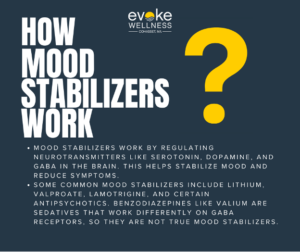You’ve heard of antidepressants and anti-anxiety meds, but what about mood stabilizers? These medications help even out extreme highs and lows for conditions like bipolar disorder. Mood stabilizers are crucial for an estimated 3% of U.S. adults who live with bipolar disorder. Yet myths and misconceptions still swirl around this family of drugs. Get the facts straight in this comprehensive guide covering everything from how mood stabilizers work to potential side effects. You’ll also learn key information like:
- The main categories of mood stabilizing medications
- Which symptoms they treat most effectively
- Pros and cons of specific drug options
- Lifestyle changes that support treatment
- Special considerations for detox and rehab programs
Call us at (617) 917-3485 today or reach out online.
What Are Mood Stabilizers and How Do They Work?
Mood stabilizers are medications used to treat bipolar disorder and other conditions involving severe mood swings. According to the study by Bain and Company, these drugs help normalize mood by controlling abnormally high (mania) and low (depression) episodes.
Treating Bipolar Disorder
Evoke Wellness provides comprehensive dual diagnosis treatment using an integrated approach with medication like mood stabilizers along with therapy. Their programs help manage co-occurring bipolar disorder and substance abuse.
Mood stabilizers play a vital role in the treatment of bipolar disorder by:
- Preventing manic and depressive episodes
- Reducing severity and frequency of mood swings
- Promoting mood regulation and emotional stability
With proper medication management and a holistic treatment plan, individuals can better control their bipolar symptoms and improve quality of life.
Types of Mood Stabilizing Drugs
Benzodiazepines
Benzodiazepines like lorazepam (Ativan) are commonly prescribed to treat anxiety disorders. They work by increasing GABA activity in the brain, producing a calming effect. However, long-term use can lead to physical dependence. Proper medical supervision is required when discontinuing.
Antidepressants
Some antidepressants exhibit mood stabilizing properties by inhibiting serotonin and norepinephrine reuptake. Tramadol is one such opioid analgesic that acts similarly to antidepressants like Effexor. While approved for pain, it may help treat conditions like depression off-label.
Anticonvulsants
Medications like lamotrigine and valproic acid, typically used to prevent seizures, also stabilize mood swings in bipolar disorder. Their mood stabilizing mechanisms likely involve GABA regulation and glutamate blockade. Careful dosing is required to avoid side effects.
Lithium
One of the oldest and most effective mood stabilizers is lithium. It’s particularly useful for treating manic episodes in bipolar disorder by regulating neurotransmitters and ion transport. However, lithium requires regular blood monitoring due to a narrow therapeutic window.
Side Effects of Mood Stabilizers
Mood stabilizers are powerful psychiatric medications that can effectively treat bipolar disorder and other mood disorders. However, they also come with the potential for unpleasant side effects. According to Evoke Wellness at Cohasset, common side effects include:
Increased Sun Sensitivity
Many mood stabilizers can make your skin more sensitive to sunlight. This increases the risk of severe sunburns, rashes, or other sun-related skin issues.
Gastrointestinal Issues
Nausea, vomiting, constipation, and dry mouth are frequently reported side effects that can be quite uncomfortable.
Impaired Coordination
Drowsiness, dizziness, and blurred vision are potential side effects that may make daily activities more challenging and potentially dangerous.
Weight Changes
Both weight gain and loss have been associated with various mood stabilizer medications.
While most side effects are manageable, some can be more severe. Rare but serious side effects like Stevens-Johnson syndrome, a life-threatening skin condition, require immediate medical attention. Certain mood stabilizers may also interact with other medications, compounding side effects.
It’s crucial to closely monitor how your body responds and promptly report any concerning symptoms to your doctor. With open communication and careful management, the benefits of mood stabilizers can often outweigh the side effect risks.
Mood Stabilizers for Bipolar Disorder Treatment
Understanding Mood Stabilizers
Mood stabilizers are a class of psychiatric medications that play a crucial role in managing the symptoms of bipolar disorder. These drugs help regulate brain chemistry and stabilize extreme mood swings between mania and depression. According to Evoke Wellness, common mood stabilizers used include lithium, valproate, carbamazepine, lamotrigine, and certain antipsychotics.
Balancing Mood Shifts
These medications work by controlling the highs and lows associated with bipolar disorder. They help prevent manic episodes characterized by impulsivity, racing thoughts, and elevated mood. At the same time, mood stabilizers also reduce the severity of depressive episodes marked by sadness, fatigue, and lack of motivation. Finding the right mood stabilizer and dosage is crucial for effective long-term management.
Comprehensive Treatment Approach
While mood stabilizers are a cornerstone of bipolar disorder treatment, Evoke Wellness emphasizes that medication must be combined with psychotherapy and lifestyle changes. Close monitoring by an experienced doctor is necessary to ensure proper medication adherence and minimize potential side effects like weight gain or cognitive issues. With the right combination of therapies, individuals with bipolar disorder can achieve symptom control and improved quality of life.
Finding the Right Mood Stabilizer for You
Considerations for Choosing
When it comes to mood stabilizers, there’s no one-size-fits-all solution. Several factors influence which medication may work best for you, including your specific diagnosis, symptoms, and potential side effects. According to the National Institute of Mental Health, it often takes trial and error to find the right mood stabilizer and dosage.
Monitoring Side Effects
All mood stabilizers carry risks of side effects, which can range from mild to severe. Common side effects include increased sun sensitivity, nausea, drowsiness, and weight gain. It’s crucial to closely monitor for any concerning symptoms like rashes or vision changes, and report them promptly to your doctor.
Medication Interactions
Some mood stabilizers, like carbamazepine, can interact with various medications. Your doctor needs a complete list of all drugs, supplements, and herbs you take to check for potential interactions. Adjustments may be required to ensure the mood stabilizer works effectively and safely.
Ongoing Evaluation
Finding the ideal mood stabilizer is an ongoing process. Regular follow-ups allow your doctor to evaluate how well the medication is working and make any needed adjustments. Be honest about continuing symptoms or side effects to help determine if a different mood stabilizer may be more suitable.
Safely Using Mood Stabilizers – Tips and Precautions
Know the Risks
Mood stabilizers like lithium can be highly effective for managing bipolar disorder and other conditions. However, they also come with potential side effects and risks. Always take them exactly as prescribed, never change dosages without medical supervision. Some common side effects include:
- Drowsiness
- Tremors
- Nausea
- Weight gain
Stay Hydrated
Proper hydration is crucial when taking lithium and certain other mood stabilizers. Dehydration increases lithium levels in the blood, raising toxicity risks. Drink plenty of fluids daily unless your doctor advises otherwise.
Monitor Closely
Have regular blood tests to check lithium levels and watch for side effects like:
- Excessive thirst
- Diarrhea
- Vomiting
Catching issues early allows dosage adjustments. Never stop taking mood stabilizers abruptly – follow your doctor’s guidance for safely discontinuing.
Lifestyle Support
A healthy lifestyle provides added stability when taking these medications:
- Eat a nutritious diet
- Exercise regularly
- Practice stress management
- Get sufficient sleep
Mood stabilizers work best combined with counseling and lifestyle changes. With proper monitoring and self-care, they can be used safely and effectively.
FAQ – Common Questions About Mood Stabilizers
What are mood stabilizers?
Mood stabilizers are medications that help control mood swings and level out the highs and lows associated with conditions like bipolar disorder. They work by regulating neurotransmitters in the brain to stabilize mood.
Who needs mood stabilizers?
Mood stabilizers are primarily prescribed for bipolar disorder to prevent manic and depressive episodes. They may also help with other conditions involving severe mood swings like schizoaffective disorder.
How quickly do they work?
It can take several weeks for mood stabilizers to take full effect. During this time, your doctor may initially prescribe other medications to provide faster symptom relief while the mood stabilizer levels build up in your system.
What are common side effects?
Some potential side effects of mood stabilizers include drowsiness, tremors, nausea, diarrhea, and weight gain. Be sure to discuss all side effects with your doctor to weigh the benefits and risks.
Can they be habit-forming?
Most mood stabilizers are not considered addictive when taken as prescribed. However, suddenly stopping them can cause withdrawal effects, so it’s important to follow doctor’s orders when discontinuing use.
Conclusion
You now have an overview of everything you need to know about mood stabilizer drugs. From understanding how they work to the side effects and risks, this guide equips you with knowledge to have informed conversations with your doctor. While mood stabilizers can help manage bipolar disorder, they must be taken carefully and under medical supervision. Consider all your treatment options, and do not be afraid to ask questions. Your mental health journey is unique, but with the right education and support network, you can find an effective path forward.
Begin Your Journey with Evoke Wellness at Cohasset
If you or a loved one is considering treatment, Evoke Wellness at Cohasset invites you to contact us. Our compassionate team is ready to answer your questions, discuss your needs, and help you take the first steps toward recovery. In Cohasset, you’ll find more than just a treatment program – you’ll discover a community dedicated to your wellness and success. Together, let’s embrace the journey to recovery and the promise of a new beginning. Call us at (617) 917-3485 today or reach out online.





